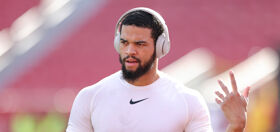
The homos simply can’t get enough Hillary Clinton. New York City’s Hunter College just released data showing that 63% of queer primary voters plan on giving Clinton the ticket. Barack Obama and John Edwards trail far behind with 22% and 7%, respectively.
The Hunter study also finds that 21% of lavender voters consider gay rights to be the most important issue, while 33% claim to be “very interested” in politics.
Interestingly enough, while 63% of voters claim to be giving Hillary their political love, 72% consider the Senator to be a “gay friendly” candidate. Only 52% find Obama to be gay friendly, while Edwards got a paltry 41%: only four points more than Republican Rudy Giuliani.
We’ve gone ahead and included the press release after the jump…
In the first public, political survey ever conducted by a university-based team of scholars with a nationally representative sample of lesbian, gay and bisexual (LGBs) Americans, results released today show that Senator Hillary Clinton has the support of 63 percent of LGB likely voters in the Democratic primaries, followed by Senator Barack Obama with 22 percent and John Edwards with 7 percent. The Hunter College Poll also finds that during the process of “coming out,” LGBs become more liberal and more engaged in the political process than the general population.
How about we take this to the next level?
Our newsletter is like a refreshing cocktail (or mocktail) of LGBTQ+ entertainment and pop culture, served up with a side of eye-candy.
“We found a stunning transformation in political views in the LGB community of a magnitude that is virtually unparalleled among social groupings in the U.S. population,” said political science professor Kenneth Sherrill of Hunter College, one of the study’s investigators. The Hunter College Poll was conducted with 768 respondents by Knowledge Networks, Inc. from November 15th through November 26th, 2007.
Other findings include:
• Nine in 10 LGB likely voters will vote in the Democratic primaries and 21 percent say that lesbian and gay rights will be the most important issue influencing their vote in 2008.
• 72 percent of LGB likely voters consider Senator Clinton a supporter of gay rights, with Senator Obama at 52 percent and former Senator Edwards at 41 percent. On the Republican side, former New York City Mayor Rudy Giuliani was at 37 percent, followed by Senator John McCain at 13 percent.
“These findings suggest opportunities. Clinton benefits from a high turnout in this very Democratic bloc; her opponents would benefit from making their stated support for gay rights more visible to LGB voters,” said Murray Edelman, a distinguished scholar at Rutgers University’s Eagleton Institute and one of the study’s investigators.
• 33 percent of all respondents say they are “very interested” in politics compared to 22 percent of the Knowledge Networks general population sample. And 36 percent said they became more interested in politics during their “coming out” period.
• LGBs were more likely than the general population to have contacted a government official in the past 12 months (23 percent to 16 percent).
“These levels of civic engagement indicate that gay people can have a bigger influence on public policy than suggested by their relatively small share of the population,” said Patrick J. Egan, an assistant professor at New York University and another of the study’s investigators.
• Asked what gay rights goals are “extremely important,” LGBs chose:

“The top priorities for LGBs bear little resemblance to the debates that have dominated the headlines,” said Egan.
• When asked about the proposed federal law making it illegal to discriminate against lesbians, gays, and bisexuals in employment, LGBs (by a margin of 60 to 37 percent) said that those seeking to pass the law were wrong to remove protections for transgendered people in order to get the votes necessary for passage in Congress.
The Hunter College Poll was funded by a grant from the Human Rights Campaign Foundation. Sole control over the design of the study’s questionnaire and analysis of the data were maintained by the study’s investigators. The survey was conducted among those who identified themselves as lesbian, gay or bisexual to Knowledge Networks, which recruits its nationally representative sample of respondents by telephone and administers surveys to them via the Internet. The survey has a margin of error of plus-or-minus 4 percentage points.




















Gregg
HRC funding a poll that pushes HRC. What a shock. The Repugs must be loving this shit. Why not just hand them the election right now, since that’s what a vote for Hillary will do.
ProfessorVP
Not that Hillary could ever win the presidency, but if she did, I assure you, three things will happen: 1) US will not leave Iraq, 2) Don’t Ask/Don’t Tell will stay, and 3) Defense of Marriage Act will still be on the books.
The Clintons, you see, like to make nice-nice to Republicans. It worked out just swell for Bill, didn’t it?
FireIsland
Alternative — “We Shall Overcome…” Make a choice – what are we ready for? You want a weak dollar? Deficit? Race Riots?
Dawster
who are these people? i need names.
Eric Stern
With HRC funding this poll, this fact immediately calls into question its credibility. Further, the reality is that it is the early state voters in IA that will provide the momentum to the candidate who has the best IA organization. That candidate is John Edwards.
http://www.bilerico.com/2007/11/edwards_knows_all_lgbt_politics_is_local.php
Chris
This is really more of a push-poll than a genuine poll. Those who took part in it and who are peddling it should be embarrassed by its shoddiness and bias. It bogusly and inaccurately posits Hillary as some kind of “lavender standard,” when she favors leaving most of DOMA intact and has not gone as far as Edwards in keeping antigay judges off the bench or as far as he and others go in supporting relationship recognition. Did rival candidates’ stances get an even-handed airing? Sponsors won’t say. And then the backers ballyhoo the results with overblown terms like “a stunning transformation in political views.” 80 percent of LGBTs backing Dems is old hat. What’s stunning is the selling of snake oil to LGBT people by a gay-rights organization. What’s transformative is that sponsors stoop to manipulating surveys with tactics more suited to discredited antigay quacks like Paul Cameron.
cjc
@FireIsland: I’m ready for riots, baby. Let’s make Minneapolis/St. Paul in 2008 look like Chicago in 1968.
Rt. Rev. Dr. RES
Professor VP – Unfortunately, your assessment about the third and potentially fourth Clinton terms is supported in both expatriate and Canadian gay blogs .
It is tragic that your choice is between someone who will do no overt harm, but will not create any substantial good (DLC) and those will do overt harm, and will also do no good at all.
Your choice is “clear” as are the results.
Bill Perdue
At election time the hype about candidates gets hysterical. Campaigns labor mightily to create self-delusional imagery to cover the grimy reality. In this case spin doctors are virtual whirling dervishes. It’s use of the term LGB, omitting the T in the equation is a dead giveaway. Barney Frank, Grand Vizier to the Heir Apparent wants nothing to do with transsexuals. He and HRC made them, and all of us, walk the plank when they gutted ENDA.
The problem with their spin is that it won’t stop wars, suppress bigotry or repair the economy. The real Hillary Clinton, who wanders between the right centrist core and the far right of the Democratic Party, promises to continue the policies followed by both Bushes and Bill Clinton. Bush/Clinton/Bush/Clinton will mean at least four more years of rightist domination of US politics and war.
That’s why Pat Robertson said of Hillary Clinton “Well, she’s tacking to the right as hard as she can tack. And you know Hillary’s got some good points.â€
The central question is the war for control of the Middle Eastern oil reserves. Bush 1’s attack against Iraq was sustained nonstop by Bill Clinton, who lied about WMD’s and used air power, missile strikes and food and medical sanctions to end Iraqi sovereignty and starve Iraqi children. Bill Clinton still defends the invasion and it’s supporters like Lieberman. In 2003 Hillary Clinton (and most of Congress) voted to go to war even after the UN refused to. Hillary Clinton’s a passionate supporter of Bush’s plans to divide Iraq into three procounsular provinces, to steal its oil and to extend the war to Iran, using nukes “if necessaryâ€. She votes for anti-constitutional measures like the Paytriot act and can be counted on to use them. She, like Obama and Edwards refuses to guarantee withdrawal before 2013.
If she wins she’ll end up recapitulating Nixon’s role in the Vietnam era. The difference is it’s unlikely she’ll get impeached and for the same reason that both Democrats and Republicans refuse to impeach Bush – they want that oil.
Like Obama she gets significant contributions from big business, although she gets more from multinational law firms because of her long association with and support for NAFTA. Don’t miss the last item, the nearly $100,000.00 from ultra rightist Rupert Murdoch. Murdoch is the neo in neo-Nazi. He and Pat Robertson ended up supporting Giuliani but both are admirers of Hillary Clinton as are extremists like Santorum and Brownback. Murdoch supports Giuliani but he’s hedging his bets by ‘contributing’ to Hillary Clinton’s campaign and holding fund raising events to introduce her to his ultraright, uberrich friends.
Her corporate contributors include:
DLA Piper $356,100
Goldman Sachs $350,050
Morgan Stanley $323,550
Citigroup Inc $307,350
National Amusements Inc $193,850
JP Morgan Chase & Co $173,350
Kirkland & Ellis $172,000
Skadden, Arps et al $151,460
Greenberg Traurig LLP $150,900
Cablevision Systems $135,113
Merrill Lynch $125,550
Time Warner $124,150
Lehman Brothers $123,450
Bear Stearns $120,580
Patton Boggs $118,400
Ernst & Young $110,650
Blank Rome LLP $105,100
Latham & Watkins $100,950
News Corp $99,350 (Fox News, owned by Rupert
Murdoch)
(Corporations can’t donate, but their managers and stockholders can through corporate PAC’s.)
Amid all the fighting, charges and counter charges Hillary Clinton has maintained a stony silence about Barney Franks gutting of the real ENDA. Frank is a key figure in her campaign. She is obstinately opposed to samesex marriage. She says it’s a state’s rights question, just as earlier Dixiecrats said civil rights was a states rights question. She’s the godmother of DOMA and DADT.
The fortunes of the Clintons have risen in part because they’re tied into support for NAFTA and its prime corporate beneficiary Wal-Mart. Hillary Clinton spent six years on the Board of Directors of Wal-Mart, her law firm represented them and she and Bill Clinton are shills for Wal-Mart, providing cover for their infamous anti-labor policies and their callous degradation of the environment.
Giuliani is the most dangerous Republican candidate because of his record, fundraising and lead in the polls. Ditto for Hillary Clinton and for the same reasons. For now, her lead at pollster dot com is 45%, with Obama a distant second at 25%.
The most important reason for voting against Hillary Clinton is that if a lot of people vote for her she might win. Bush/Clinton/Bush/Clinton = four or even eight more years of grubby right wing politics.
If you’d like a list of sources you can reach me at donal1944 at msn dot com. Using hyperlinks in postes sometimes alerts Queerty’s internet guard at and you get shut out. The sources include CNN, YouTube, The Boston Globe, AlterNet, Mother Jones, CBS news, ABC news and the newsletter of the National Nurses Organizing Committee, AFL-CIO.
ProfessorVP
1) Progressives know she is no progressive, just the opposite, and won’t vote for her. 2) Conservatives mistakenly believe she is a liberal, and won’t vote for her. 3) Unpleasant to the eye and especially the ear.
Need I list more reasons why Hillary can’t win?
Teiresias
There is NO EFFIN’ WAY I will ever vote for her. I’ll sit out the election rather than vote for another dynastic president who will make all kinds of promises to get my vote and then not follow through. The only candidates that make any sense at all from a gay rights perspective are Kucinich and Gravel. Needless to say, with the corporate controlled and lobbyist funded elections, neither has a chance of winning. Still, sheeple will continue to be herded into voting for Hillary and from there straight into the ovens.